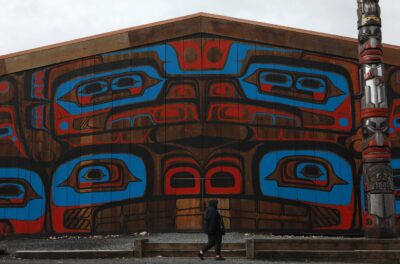Racial profiling of customers a neglected human rights issue, report says
By Canadian Press on August 14, 2025.

Heiltsuk Tribal Council Chief Marilyn Slett says no one in her community is immune to the small acts of racial profiling that can embed themselves in the everyday life of an Indigenous person in Canada.
“It’s my parents going to a restaurant, and it’s not a busy time in that restaurant, and they’re refusing to serve them,” she said.
“(It’s) myself going grocery shopping in a neighbouring community and having a store employee literally follow me around in the grocery store. These things happen to our community members, our Indigenous people, on a daily basis and it’s to some degree being normalized.”
The behaviour, known as consumer racial profiling, is a neglected human rights issue in Canada that requires proper study, according to a new report written by two Canadian human rights experts.
The study released Thursday says “consumer racial profiling is a deep-seated social phenomenon often with low visibility in our daily round of life where the corresponding adverse social harms routinely go unnoticed or are interpreted as normal practice and so ‘business as usual.'”
The call for more research is one of a series of recommendations in the report by Lorne Foster and Lesley Jacobs which was commissioned by the Heiltsuk Nation as part of a B.C. Human Rights complaint against a Canadian Tire outlet in Coquitlam, B.C.
A father and daughter say they experienced racial profiling and racism while shopping in 2020.
Foster said small actions like being followed around, singled out for scrutiny, or closely monitored by a clerk or guard who suspects they may steal, can have a cumulative effect over time, building to a point where someone might go public with their experience, in what he describes as a thousand small cuts.
“This goes on for months. It goes on for years. And it actually only builds. It becomes cumulative at that time, and those are the times when you’ll see something magnified occur.”
But the impact goes beyond the individual, he said.
“In terms of the community, I think that what we have is a situation where there are entire generations that actually are wounded, and these wounds are transmitted from generation to generation,” he said.
“And they form a kind of oppression that surrounds this group, generation after generation, which cannot only impact Indigenous mental health, but also emotional and physical health as well.”
The accusations against Canadian Tire have not been proven. A hearing on the B.C. Human Rights case is expected to take place in October.
The complaint alleges that Dawn Wilson and her father Richard Wilson were at the store to get new tires installed. Dawn Wilson says a guard with a third-party company asked to search her father’s backpack, despite other customers having similar bags.
Wilson, a member of the Heiltsuk Nation, says when she raised what happened with one of the store’s mechanics, instead of taking the incident seriously, he responded with a racist anecdote.
When the pair went public with the complaint last year, Canadian Tire issued a statement saying it takes claims of racial profiling and racism very seriously and they should not happen.
The company said the owner of the store “has been actively at the table, co-operating with the tribunal since the claim was filed.”
Canadian Tire did not immediately respond to a request for an updated comment following the report.
Jacobs said research on the topic is lacking, considering how pervasive consumer racial profiling appears to be.
He said consumer racial profiling doesn’t get the same type of attention as alleged profiling by police, for example.
“What we’re trying to say is that consumer racial profiling for Indigenous folks is so everyday that it doesn’t tend to have the highlights that (come) when police are involved. There tends to be concerns about police shootings, use of force, all of those kinds of things that accompany police action that often are not involved consumer racial profiling,” he said.
Greg Wilson, the Retail Council of Canada’s director of government relations for B.C., said he can’t comment on the Wilsons’ complaint but said consumer racial profiling is a serious issue in Canada.
“It is, of course, against the Canadian Human Rights Act and despite this law, we certainly acknowledge that there are customers who are visible minorities, they’re significantly more likely to be followed, searched or ignored in a retail setting,” he said.
Wilson said the council offers online training that was developed as the result of complaints, and many larger companies have training of their own.
“Periodically, we do tell our members and other retailers who subscribe to our materials … that this exists, and incidents when it comes into the news are great opportunities for us to do exactly that,” he said.
Foster and Jacobs, whose work includes a more than decade-long study of race-based data collected by the Ottawa Police Service during traffic stops, said data could be collected on consumer racial profiling if major businesses decide to step up.
“We look for a leading national bank to work with researchers to begin to collect data so that you can identify whether there are risks of Indigenous consumer racial profiling when people come in to open bank accounts, when they come into cash cheques, whatever that might be, and begin to collect data in those contexts with those willing partners,” Jacobs said.
“In the same way that in policing, Ottawa’s lead then became a model for dozens of other police services across the across the country.”
Slett said the nation supports all of the recommendations from Foster and Jacobs’ report, which also include calls for better education, training and a recognition that restorative justice measures, including healing ceremonies, have an important role in remedying the harm.
“For all of us, to some degree, we’ve experienced the type of discrimination that we’re talking about here today, and we know that it needs to stop. We need to be able to talk about this and shine a light on it, and find ways to do things better,” she said.
This report by The Canadian Press was first published Aug. 14, 2025.
Ashley Joannou, The Canadian Press
35-34




